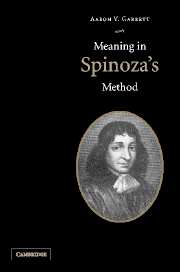Book contents
- Frontmatter
- Contents
- Acknowledgments
- List of abbreviations
- Texts and editions
- Introduction
- 1 A worm in the blood: some central themes in Spinoza's Ethics
- 2 A few further basic concepts
- 3 Emendative therapy and the Tractatus de Intellectus Emendatione
- 4 Method: analysis and synthesis
- 5 Maimonides and Gersonides
- 6 Definitions in Spinoza's Ethics: where they come from and what they are for
- 7 The third kind of knowledge and “our” eternity
- Bibliography
- Index of passages referred to and cited
- General index
7 - The third kind of knowledge and “our” eternity
Published online by Cambridge University Press: 22 September 2009
- Frontmatter
- Contents
- Acknowledgments
- List of abbreviations
- Texts and editions
- Introduction
- 1 A worm in the blood: some central themes in Spinoza's Ethics
- 2 A few further basic concepts
- 3 Emendative therapy and the Tractatus de Intellectus Emendatione
- 4 Method: analysis and synthesis
- 5 Maimonides and Gersonides
- 6 Definitions in Spinoza's Ethics: where they come from and what they are for
- 7 The third kind of knowledge and “our” eternity
- Bibliography
- Index of passages referred to and cited
- General index
Summary
This final chapter is concerned with explicating what Spinoza refers to as the scientia intuitiva or the third kind of knowledge. The scientia intuitiva has pride of place among Spinoza's three kinds of knowledge due both to its importance and difficulty. In the Ethics and the KV he related it to love of God and the part of us that is eternal. He emphasized it in the TIE as well, although in both the TIE and the KV he referred to it as the “fourth kind of knowledge” (Spinoza collapsed the first two sorts of knowledge described in the KV and the TIE into one category, imagination, in the Ethics).
What is the third kind of knowledge? In the Ethics the third kind of knowledge is distinguished from the first kind of knowledge – imagination including memory and testimony, and from the second kind of knowledge, reason. After considering these other sorts of knowledge Spinoza described the third kind of knowledge as “a kind of knowing which proceeds from an adequate idea of the formal essence of certain attributes of God to the adequate knowledge of the [NS: formal] essence of things” (iip40s2, CW 478). In the TIE Spinoza described it in similar terms: “a thing is perceived through its essence alone” and we know we are engaged in intuitive knowledge when “from the fact that I know something, I know what it is to know something” (TIE 22).
- Type
- Chapter
- Information
- Meaning in Spinoza's Method , pp. 181 - 223Publisher: Cambridge University PressPrint publication year: 2003

